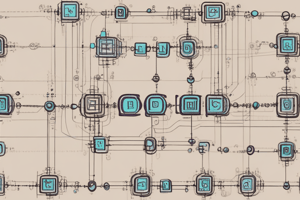Podcast
Questions and Answers
तद्वाक्यार्थं 'कांप्यूटर विज्ञाने संबन्धितं किं अभिज्ञातव्यं भवेत्?'
तद्वाक्यार्थं 'कांप्यूटर विज्ञाने संबन्धितं किं अभिज्ञातव्यं भवेत्?'
SQL, डेटा मॉडेलिंग, संबंधीय डेटाबेसेस्
किं अभिज्ञातव्यं 'समकालिक-वितरणीय सिद्धान्ताः' इति?
किं अभिज्ञातव्यं 'समकालिक-वितरणीय सिद्धान्ताः' इति?
समकालिकता एव सम्यक्ता
कस्मिं विषये 'संकल्पना एव योग्यता' उपजीविष्यते?
कस्मिं विषये 'संकल्पना एव योग्यता' उपजीविष्यते?
संकल्पना एव योग्यतां उत्पादयति
कथं 'अनुकरणीय सिद्धान्ताः' अभिज्ञातव्याः सन्ति?
कथं 'अनुकरणीय सिद्धान्ताः' अभिज्ञातव्याः सन्ति?
कः प्राधान्यं लाभं आप्नोति 'सुरक्षा एव एन्क्रिप्टियन्' इति?
कः प्राधान्यं लाभं आप्नोति 'सुरक्षा एव एन्क्रिप्टियन्' इति?
कः प्राधान्यं लाभं आप्नोति 'सत्यापनं एव आधिकरणं' इति?
कः प्राधान्यं लाभं आप्नोति 'सत्यापनं एव आधिकरणं' इति?
किं कारणं डेटा संरचनायाः अभ्यासः महत्त्वपूर्णः अस्ति?
किं कारणं डेटा संरचनायाः अभ्यासः महत्त्वपूर्णः अस्ति?
किं विषये ऑपरेटिङ्ग् सिस्टम्स् अध्ययनं महत्त्वपूर्णमस्ति?
किं विषये ऑपरेटिङ्ग् सिस्टम्स् अध्ययनं महत्त्वपूर्णमस्ति?
कस्मिन् विषये नेटवर्किङ् अध्ययनं अवश्यमस्ति?
कस्मिन् विषये नेटवर्किङ् अध्ययनं अवश्यमस्ति?
कः कारणं डेटाबेस् सिस्टम्स् प्रयोज्यन्ते?
कः कारणं डेटाबेस् सिस्टम्स् प्रयोज्यन्ते?
कः समाधानं डेटासंरचना और एल्गोरिथ्मसु अध्ययने कार्यक्षमतायाम् करोति?
कः समाधानं डेटासंरचना और एल्गोरिथ्मसु अध्ययने कार्यक्षमतायाम् करोति?
कश्चित् अध्यापनं नः सिद्धान्तानां विशेषं विवरयति?
कश्चित् अध्यापनं नः सिद्धान्तानां विशेषं विवरयति?
Flashcards are hidden until you start studying
Study Notes
Intermediate 2nd Year: Exploring Computer Science
As you move through your second year of academic studies, you'll likely find yourself delving deeper into the world of computer science. This article aims to outline some of the key concepts and topics you may encounter during this intermediate stage of your computer science journey.
Data Structures and Algorithms
Understanding data structures and algorithms is fundamental and allows you to solve problems efficiently and effectively. In this course, you'll encounter topics like:
- Different types of data structures (e.g., arrays, linked lists, stacks, queues, trees, graphs)
- Analysis of algorithms, including time and space complexity
- Common sorting and searching algorithms (e.g., merge sort, quick sort, binary search)
Operating Systems
Operating systems provide a crucial foundation for understanding how computers function at a lower level. By studying operating systems, you'll learn about:
- Process management
- Memory management
- Synchronization
- I/O management
- File systems
- Security
Networking
Networking is an essential aspect of computer science because it allows computers to communicate and exchange information. In this course, you'll learn about:
- TCP/IP protocol
- Internet architecture
- Routing algorithms
- Network topologies
- Network security
Database Systems
Database systems are used to store, manage, and retrieve data. In this course, you'll learn about:
- SQL (Structured Query Language)
- Data modeling
- Relational databases
- NoSQL databases
- Database optimization
Concurrent and Distributed Systems
Concurrent and distributed systems are becoming increasingly important in today's computing landscape. In this course, you'll learn about:
- Concurrency and synchronization
- Distributed systems architecture
- Communication protocols
- Distributed algorithms
- Consensus protocols
Compiler and Assembly Language
Compilers and assembly language allow you to understand the relationship between high-level programming languages and machine code. In this course, you'll learn about:
- Compiler design
- Assembly language
- Virtual machines
- Machine code
- Optimization techniques
Artificial Intelligence and Machine Learning
Artificial intelligence and machine learning are changing the way computers process and interpret information. In this course, you'll learn about:
- Algorithms for machine learning (e.g., SVM, KNN, decision trees)
- Deep learning concepts (e.g., neural networks, convolutional neural networks)
- Reinforcement learning
- NLP (Natural Language Processing)
Security and Cryptography
Security and cryptography are essential for ensuring the protection of data and systems. In this course, you'll learn about:
- Cryptographic primitives (e.g., encryption, digital signatures)
- Security threats and attacks (e.g., SQL injection, cross-site scripting)
- Authentication and authorization
- Secure development practices
Projects and Problem Solving
In addition to studying the theory behind computer science concepts, you'll also be working on projects that allow you to apply your knowledge in real-world scenarios. This will help you develop your problem-solving skills and learn how to collaborate with others.
As you progress through your intermediate 2nd year, the courses and projects you encounter will help you build a solid foundation in computer science. By the end of this year, you'll be well-equipped to tackle more advanced topics and projects in your future studies.
Studying That Suits You
Use AI to generate personalized quizzes and flashcards to suit your learning preferences.




